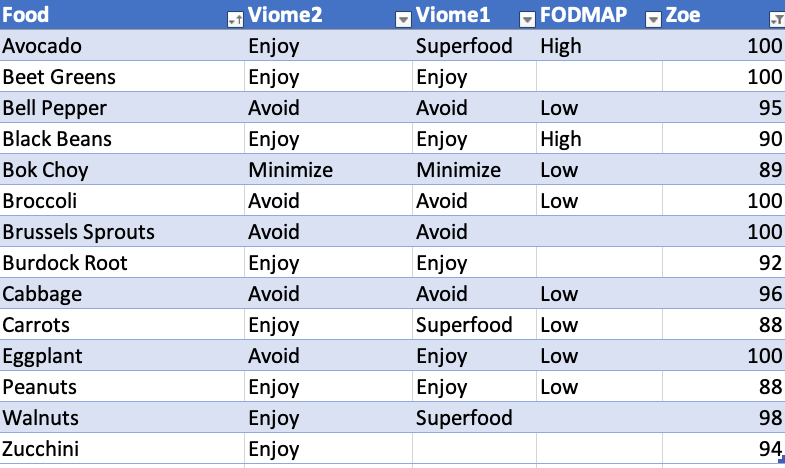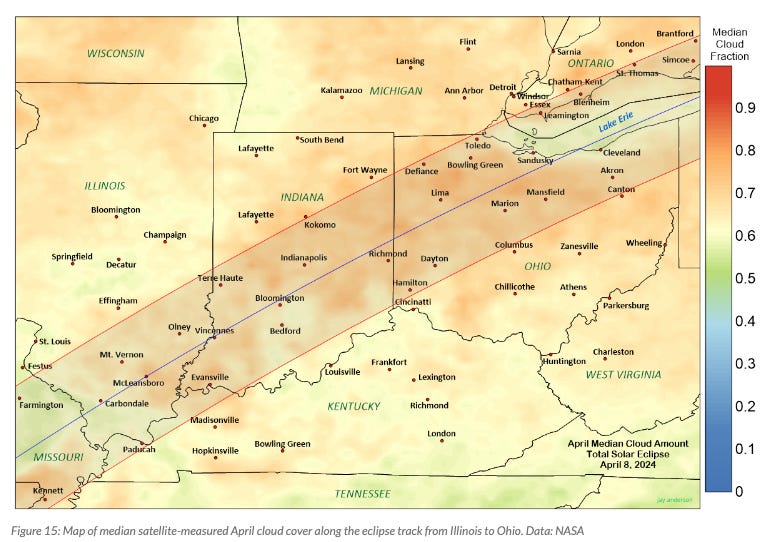Personal Science Week - 240404 Food Sensitivity
How good are those at-home food sensitivity tests? Plus useful links
Many chronic conditions, like odd skin problems or intermittent headaches or gut issues, are extremely difficult to diagnose. How can personal science help?
This week and next we’ll look at food sensitivity tests.
Food Sensitivity Part 1
Personal scientists prefer objective measurements, especially if we can do it at home for a reasonable price. There are now many commercial tests for food sensitivity that provide an easy opportunity for self-experimentation.
I’ve personally tried just about every microbiome test, many of which include specific suggestions for foods I should enjoy or avoid. These are the food recommendations when I compared Zoe with two tests from Viome (taken 6 months apart)), plus what I got (for free) from the advice from a FODMAP dieting site:
Each diet measures quality differently so they’re not always directly comparable. Zoe ranks foods on a scale from 0 - 100, while Viome has a four-category scale (Avoid, Minimize, Enjoy, Superfood). In this chart I filtered just the foods that Zoe thinks are specially good for me.
As you can see, my first Viome test (Viome1) gave opposite advice from Zoe, telling me to avoid items that Zoe ranks highly (Brussels Spouts, Bell Pepper, Cabbage, Bok Choy). Many of these same items were ranked differently again on a Viome followup test: eggplant was good in one case but not the other.
Meanwhile, a (free) FODMAP diet, designed for people with certain food insensitivities, disagreed with both microbiome tests on some key items.
I’m reasonably healthy, and I didn’t test super-rigorously with same-day samples, etc. so these test makers can argue that this wasn’t a scientific comparison. But that’s not the point. My experience is from the perspective of a typical user — a personal scientist, who while not clinical-grade, is certainly closer to the way normal people will experience the product.
What about other tests, especially those intended to uncover food allergies and other sensitivities? A friend send me the results of a food sensitivity test she did with Everywell and I’ll report more in next week’s issue.
Clinical Studies to Consider
Imyoo is a new Illumina-backed company that "empowers patients to become patient scientists". You can sign up for their studies in Inflammatory Bowel Disease (IBD), Rheumatoid Arthritis, or (like me) the Baseline — so they have somebody to compare with. They send you an at-home blood testing kit to analyze cell RNA. You can opt in to receive a personalized report like this one:

The tests are not (yet) available directly to consumers, and with low volumes they’re still on the expensive side (several hundred dollars), but meanwhile please sign up!
Links Worth Your Time
Will you be in the path of the eclipse on April 8th? Jay Anderson is a Canadian meteorologist and lifelong amateur eclipse expert whose website Eclipsophile is the best resource for tracking the path it will take as well as the likely weather patterns along the way.
Gift idea for personal scientists who like plants? LightBio is taking pre-orders for their $50 glow-in-the-dark Petunias. They promise to ship in May and yes, they are USDA approved. (See more at Technology Review and a 2020 Nature Horticulture review article).
The Future of Digital Health newsletter published an overview of 18 wearable health trackers including smart socks, an asthma inhaler, and more. Some of the devices, like the $100 Eyecue vision test system, are apparently no longer available but it’s inspiring to see what sorts of technologies are in development.
A BBC writer says “I tracked my health but it made me grumpy and obsessive – I stopped and feel great”. Not everyone is cut out to be a personal scientist, but in this case I wonder if she stopped tracking precisely because she understands personal science. When your data collection comes at the expense of your goal, you are missing the point. See our discussion in PS Week 221229: Successful science is data + methods of the data collection + logic that ties it together.
About Personal Science
Nullius in verba is the motto of the Royal Society, established in 1660 and it’s a rule for personal scientists too. We’re open-minded but skeptical.
These weekly updates are free for everyone, but paid subscribers will also receive our Unpopular Science series, in which we bring up subjects that would be, uh, career-limiting for professional scientists, such as this week’s edition on measuring IQ and its consequences,
If you have experience with food sensitivity tests, please email us or leave a comment.







"patient scientists" -- is that what they call guinea pigs now? Signed up 😀
FODMAP is not general gut bio advice. rather, it specifically targets people with bad precessing of certain complex fibers. FODMAP lists the foods containing specific types of complex carbohydrates / fibers.
the uses is to avoid undigested complex carbs which tend to ferment and cause digestion issues. usually for people with IBS